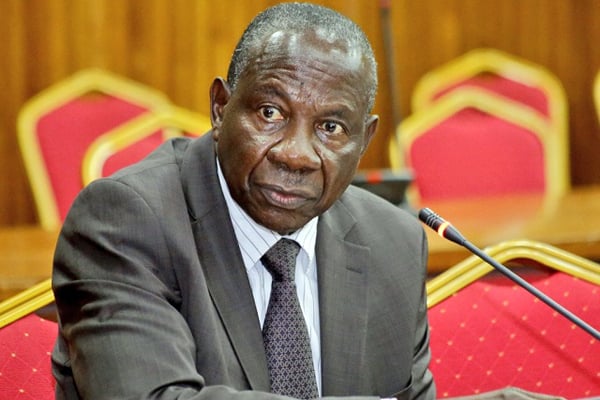Prime
Report recommends contraceptives for teenagers

Doctor holding a copper IUD. PHOTO | GETTYIMAGE
What you need to know:
- The authors said the “skewed perspective” about the cause of teenage pregnancy and how to address it has made policymakers focus on wrong strategies that have not yielded the desired outcome.
A report of a study conducted among 44,200 people across the country has recommended free access to contraceptives and condoms for teenagers to curb around 1,000 unwanted pregnancies happening daily among them.
“A large majority, 63 percent of respondents, indicated that the main reason for teenage pregnancy is young people practicing unsafe sex and accidentally getting pregnant,” the report reads.
This information is contained in the report authored by a non-governmental organisation, Trac FM, in collaboration with Uganda Women’s Network (Uwonet), Reach a Hand Uganda (Rahu), and the Belgium government.
Trac FM is a Kampala-based organisation that collects real time data on cultural, socio-economic and political trends from citizens’ perspectives to inform policies and programmes.
Trac FM survey was done between October 2022 to February 2023 on 9 radio stations in Buganda, Busoga, Ankole, Tooro, Teso, Lango, Karamoja, Acholi, and West Nile. The report indicates that 44,200 responses were obtained on the four poll questions during live radio shows.
According to the report, besides the major cause of teenage pregnancy above, other causes were forced sex through rape defilement, and incest (14 percent), a boy and girl deciding to have a baby (13 percent), and planned pregnancy through child marriage (10 percent).
“These findings are a stark contrast with the government’s position described in Uganda National Strategy to End Child Marriage and Teenage Pregnancy in Uganda,” the report reads.
“While the strategy acknowledges the negative consequences of teenage pregnancy, it only recognises teenage pregnancy as a consequence of child marriage, rape and defilement, and ignores the fact that teenagers are experimenting with unsafe sex, as well as the importance of contraceptives in addressing the issue of teenage pregnancies,” the report further reads further.
Relevant agenda
Dr Jotham Musinguzi, the director general of the National Population Council, said the issue of promoting contraceptives among young people is a development matter that cannot be ignored.
“The government is making sure young people are empowered, not only to get educated and jobs, but if they don’t use family planning and they are sexually active, they are going to become pregnant,” he said in an interview.
“Then all these things will be interfered with –the ability to continue with education, get skills and employment. That becomes a development issue. If these young people become pregnant too early, there are complications that will happen –they will need to be operated on to deliver safely, but the services may not be easily available and the operation itself may have other effects,” he added.
According to statistics from the United Nations Population Fund, 32,000 teenagers got pregnant every month in Uganda between 2020 and 2021 during the Covid-19 period when schools were closed. This made the Population Division of the United Nations rank Uganda as 10th in the world in terms of teenage pregnancy.
The surveyors from Trac FM also asked respondents about ways Uganda can curb teenage pregnancy and the majority were not aligned with the plan of promoting contraceptives and condoms among teenagers.
The authors said the “skewed perspective” about the cause of teenage pregnancy and how to address it has made policymakers focus on wrong strategies that have not yielded the desired outcome.
“The government policy is strongly influenced by religious institutions that may resist acknowledging the importance of safe sex practices, as it conflicts with their doctrine and values,” the report reads.
“….many policymakers and even civil society organisations believe that the solution to teenage pregnancies lies in punishing the so-called perpetrators and providing assistance to the victims,” the authors added.
They recommended that it is only through “emphasising education and prevention measures such as promoting safe sex practices and educating young people about contraception” that parents and policymakers can help reduce the number of unintended pregnancies among adolescents.
However, Sheikh Ali Waiswa, the deputy Mufti of Uganda and a member of the executive board of the Inter-Religious Council, told Monitor that the government should instead focus on married couples.
“Ideally, religious leaders advocate for restraining out of the activity of sexual relationship an early age,” Sheikh Waiswa said, adding: “Contraceptives can help in a married couple but for people who are not married, that would be promoting promiscuity and fornication.”
His remarks come a month after the government signed a pact with the United Nations Population Fund to promote the use of contraceptives among adolescents and young people as a way of curbing teenage pregnancies.
Statistics
In the report, 43 percent of respondents said young people should be told to abstain, and 14 percent said people should avoid mentioning contraceptives as it will lead to promiscuity. But the authors of the report were not in agreement with them.
Only 16 percent recommended free access to condoms for young people, 13 percent recommended free access to contraceptives, while 14 said the government should educate teenagers at school on contraceptives and family planning.



